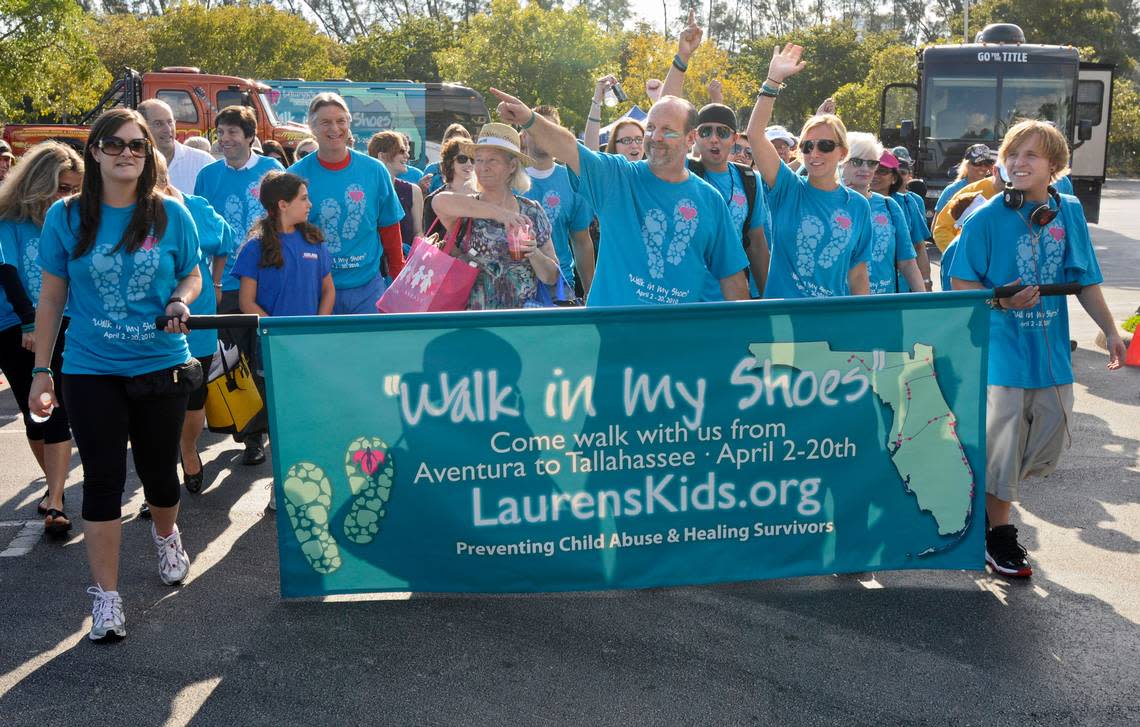A Florida law requires everyone to report suspected child abuse. Here’s what to know

After the child sex abuse scandal involving Penn State football coach Jerry Sandusky, Florida legislators in 2012 passed a law that placed a greater responsibility on ordinary people to report known or suspected child abuse. The Protection of Vulnerable Persons Act made everyone in Florida a mandatory reporter who must call the state hotline or electronically report child abuse, including sexual abuse, when they know or reasonably suspect that it is occurring.
The Florida Abuse Hotline, which can be reached at 1-800-962-2873, operates 24 hours a day, though reports can also be made online. State law allows most civilian reporters to make a report anonymously.
According to the Department of Children and Families, people reporting abuse should be prepared to provide as many details as they can, including descriptions of the incident, information on who was involved, when and where it occurred, and information on the extent of any injuries sustained.
Experts say that it is not necessary to be certain that sexual abuse is occurring to make a report.
“We never want people to think it is their job to investigate, but it is our legal responsibility to make a report,” said Lauren Book, the founder of Lauren’s Kids, a nonprofit that works to fight child abuse and that pushed lawmakers to pass the 2012 legislation.
“If you have a concern, don’t ignore it,” said Jenny Coleman, a licensed clinician in Massachusetts and the director of Stop it Now!, a nonprofit committed to preventing child sexual abuse. “You don’t need proof. It could just be your gut. Something doesn’t feel right. Typically, if your gut doesn’t feel right, there is a warning sign, and you just haven’t been able to put words to it yet.”
How to spot potential perpetrators
Experts say that it is important to catch sexual abuse in the early stages. According to Coleman, the warning signs often escalate from small unwanted advances to a more extreme crossing of boundaries. She says it is important to take action early on by speaking to the perpetrator or reporting the abuse.
Perpetrators try to test boundaries with kids first, she said. This can look like using more mature language or touching a child on the shoulder, but it can then escalate.
“The person is kind of testing the vulnerability of a child. They are testing, you know, how far can I go before anybody is alert? And if nobody has said anything, it’s kind of permission for the next step,” Coleman said.
Experts also say that people should be alert for individuals who don’t seem to understand the proper boundaries of adult-child relationships.
“Any adult who says to a child, ‘I’m your friend,’ for me, is a warning sign. I understand wanting to be friendly with kids. I’ve done that myself. But at the same time, that’s not the role of an adult, particularly an adult in a professional role, like a coach, a teacher, you know, pastor, etcetera, with a child,” Coleman said.
People should also be wary about adults who introduce kids to things that are not age appropriate, like alcohol or pornography.
“Even with a young teenager, it’s not appropriate, you know?” Coleman said. “We need to understand that these are pathways.”
Setting boundaries
Coleman said it is important for families to set safety rules at home so that kids then emulate those behaviors in the outside world. For example, parents may teach a child that it’s not normal for an adult to walk into the bathroom while they’re in it. If it doesn’t happen at home, then the child will speak up if it happens outside of the home.
She also said it’s important for parents and bystanders to set boundaries if they see a child in a potentially unsafe situation. They may want to tell an adult who is behaving inappropriately that they don’t like what they’re doing and to not do it anymore. That lets the other person know that someone is looking out and may lead to the person adapting and correcting their behavior. Coleman also suggested having a more in-depth conversation with the person about the rules or social norms and the potential consequences they could face if they continue their behavior.
In workplaces where children are around, there should be clear rules that employees, parents and teachers should understand and follow, said Coleman. That way, if inappropriate behavior arises, that person can be reminded of the rules or be reprimanded or reported.
What to do if you or someone you know has an unwanted sexual attraction
There are also resources available for adults who have an unwanted sexual attraction and need professional support. The Stop It Now! helpline responds to bystanders, parents, neighbors, community members, professionals, people who have experienced sexual harm, and those who are at risk or who are abusing others. It provides individuals with resources, counseling, support and language to ask for help.
“Some of the adults that we’re reaching, that we hold accountable, are adults who are at risk of abusing themselves, who either recognize in themselves an unwanted sexual attraction, thoughts and feelings towards children, or just for other reasons [are] struggling around safe boundaries,” said Coleman.
The Stop It Now! helpline is open during the following hours at 1-888-PREVENT:
Monday 12 p.m. to 8 p.m. EST
Tuesday 12 p.m. to 6 p.m. EST
Wednesday 12 p.m. to 6 p.m. EST
Thursday 10 a.m. to 6 p.m. EST
Friday 12 p.m. to 6 p.m. EST
Coleman said the organization also has a newer program called “What’s Okay?” that provides tips and a helpline for teens and young adults ages 14 to 22 who have questions and concerns about safe sexual behaviors.
On the Stop It Now! website, you can find general tip sheets on warning signs of childhood sexual abuse.

